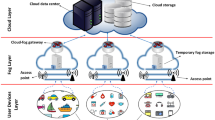Abstract
As more and more applications with high computing requirements appear on mobile devices, considering the limited computing resources and energy of those devices, many devices offload this type of task to the surrounding cloud or fog. By offloading tasks to the server, mobile devices can save execution time and energy. However, designing an effective offloading strategy that balances performance with energy efficiency remains a challenge. This paper proposed a robust system that considers energy consumption, execution time, load balancing and popularity in offloading decisions. The goal of the system is to maximize the execution efficiency of mobile devices and minimize their overall energy consumption. The experiments demonstrate that the proposed method requires low execution time and energy consumption on the part of mobile devices, increases the utilization of the server, and still effectively reduces overall energy consumption and execution time in all scenarios.
















Similar content being viewed by others
Data availibility
The datasets generated during and/or analysed during the current study are available from the corresponding author on reasonable request.
References
Fernando N, Loke SW, Rahayu W (2013) Mobile cloud computing: a survey. Future Gener Comput Syst 29(1):84–106. https://doi.org/10.1016/j.future.2012.05.023
Kumar K, Liu J, Lu Y-H, Bhargava B (2012) A survey of computation offloading for mobile systems. Mob Netw Appl 18(1):129–140. https://doi.org/10.1007/s11036-012-0368-0
Tang J, Yu R, Liu S, Gaudiot J-L (2020) A container based edge offloading framework for autonomous driving. IEEE Access 8:33713–33726. https://doi.org/10.1109/access.2020.2973457
Boukerche A, Guan S, De Grande RE (2018) A task-centric mobile cloud-based system to enable energy-aware efficient offloading. IEEE Trans Sustain Comput 3(4):248–261. https://doi.org/10.1109/tsusc.2018.2836314
Jia M, Yin Z, Li D, Guo Q, Gu X (2019) Toward improved offloading efficiency of data transmission in the IoT-cloud by leveraging secure truncating OFDM. IEEE Internet Things J 6(3):4252–4261. https://doi.org/10.1109/jiot.2018.2875743
Zhu Q, Si B, Yang F, Ma Y (2017) Task offloading decision in fog computing system. China Commun 14(11):59–68
Yen CC (2019) An intelligent decision method for task offoading in fog computing system. Master’s thesis, National Yang Ming Chiao Tung University. https://hdl.handle.net/11296/sprx5c
Lin Y, Shen H (2017) EAFR: an energy-efficient adaptive file replication system in data-intensive clusters. IEEE Trans Parallel Distrib Syst 28(4):1017–1030. https://doi.org/10.1109/tpds.2016.2613989
Khan AR, Othman M, Madani SA, Khan SU (2014) A survey of mobile cloud computing application models. IEEE Commun Surv & Tutor 16(1):393–413. https://doi.org/10.1109/surv.2013.062613.00160
Dinh HT, Lee C, Niyato D, Wang P (2013) A survey of mobile cloud computing: architecture, applications, and approaches. Wirel Commun Mob Comput 13(18):1587–1611. https://doi.org/10.1002/wcm.1203
Singh A, Chatterjee K (2017) Cloud security issues and challenges: a survey. J Netw Comput Appl 79:88–115. https://doi.org/10.1016/j.jnca.2016.11.027
Naha RK et al (2018) Fog computing: survey of trends, architectures, requirements, and research directions. IEEE Access 6:47980–48009. https://doi.org/10.1109/access.2018.2866491
Wu H (2018) Multi-objective decision-making for mobile cloud offloading: a survey. IEEE Access 6:3962–3976. https://doi.org/10.1109/access.2018.2791504
Zhang Z and Li S (2016) A Survey of Computational Offloading in Mobile Cloud Computing. In: Presented at the 2016 4th IEEE international Conference on mobile cloud computing, services, and engineering (MobileCloud)
Huang X, Xu K, Lai C, Chen Q, Zhang J (2020) Energy-efficient offloading decision-making for mobile edge computing in vehicular networks. EURASIP J Wirel Commun Netw 1:2020. https://doi.org/10.1186/s13638-020-1652-5
Qi Q et al (2019) Knowledge-driven service offloading decision for vehicular edge computing: a deep reinforcement learning approach. IEEE Trans Veh Technol 68(5):4192–4203. https://doi.org/10.1109/tvt.2019.2894437
Mohammed T, Joe-Wong C, Babbar R, and Francesco MD (2020) Distributed inference acceleration with adaptive DNN partitioning and offloading. In IEEE INFOCOM 2020 - IEEE Conference on computer communications, 6-9 July 2020, pp. 854-863. 10.1109/INFOCOM41043.2020.9155237
He Q et al (2020) A game-theoretical approach for user allocation in edge computing environment. IEEE Trans Parallel Distrib Syst 31(3):515–529. https://doi.org/10.1109/tpds.2019.2938944
Song T, Wang Y, Li G, Pang S (2019) Server consolidation energy-saving algorithm based on resource reservation and resource allocation strategy. IEEE Access 7:171452–171460. https://doi.org/10.1109/access.2019.2954903
Liu J, Shen H, Narman HS (2019) Popularity-aware multi-failure resilient and cost-effective replication for high data durability in cloud storage. IEEE Trans Parallel Distrib Syst 30(10):2355–2369. https://doi.org/10.1109/tpds.2018.2873384
Liang J et al (2021) Multi-head attention based popularity prediction caching in social content-centric networking with mobile edge computing. IEEE Commun Lett 25(2):508–512. https://doi.org/10.1109/lcomm.2020.3030329
Hao Y, Chen M, Hu L, Hossain MS, Ghoneim A (2018) Energy efficient task caching and offloading for mobile edge computing. IEEE Access 6:11365–11373. https://doi.org/10.1109/access.2018.2805798
Gao J, Zhang S, Zhao L, Shen X (2021) The design of dynamic probabilistic caching with time-varying content popularity. IEEE Trans Mob Comput 20(4):1672–1684. https://doi.org/10.1109/tmc.2020.2967038
Kaur K, Singh J, and Ghumman NS (2014) Mininet as software defined networking testing platform. In international Conference on communication. Computing & Systems (ICCCS), pp. 139-42
. Fontes R. d. R and Rothenberg C. E (2016) Mininet-wifi: A platform for hybrid physical-virtual software-defined wireless networking research. In Proceedings of the 2016 ACM SIGCOMM Conference, pp. 607-608
I. Corporation. "Intel® core \({{\rm {TM}}}\) i7-4770K Processor." https://ark.intel.com/content/www/us/en/ark/products/75123/intel-core-i7-4770k-processor-8m-cache-up-to-3-90-ghz.html
I. Corporation. "Intel® Core\({{\rm {TM}}}\) i7-6950X Processor Extreme Edition." https://ark.intel.com/content/www/us/en/ark/products/94456/intel-core-i7-6950x-processor-extreme-edition-25m-cache-up-to-3-50-ghz.html
C. Ragona, F. Granelli, C. Fiandrino, D. Kliazovich, and P. Bouvry (2015) Energy-efficient computation offloading for wearable devices and smartphones in mobile cloud computing. In 2015 IEEE global communications Conference (GLOBECOM). IEEE, pp. 1-6
Acknowledgements
This research is supported by MOST 109-2410-H-009-019 and MOST 110-2410-H-A49-017-MY2 of Ministry of Science and Technology, Taiwan.
Author information
Authors and Affiliations
Corresponding author
Additional information
Publisher's Note
Springer Nature remains neutral with regard to jurisdictional claims in published maps and institutional affiliations.
Rights and permissions
About this article
Cite this article
Chuang, YT., Hsiang, CS. A popularity-aware and energy-efficient offloading mechanism in fog computing. J Supercomput 78, 19435–19458 (2022). https://doi.org/10.1007/s11227-022-04626-w
Accepted:
Published:
Issue Date:
DOI: https://doi.org/10.1007/s11227-022-04626-w




